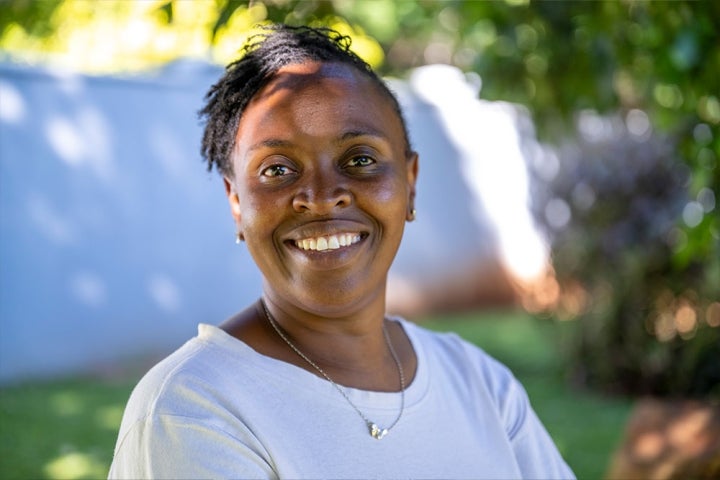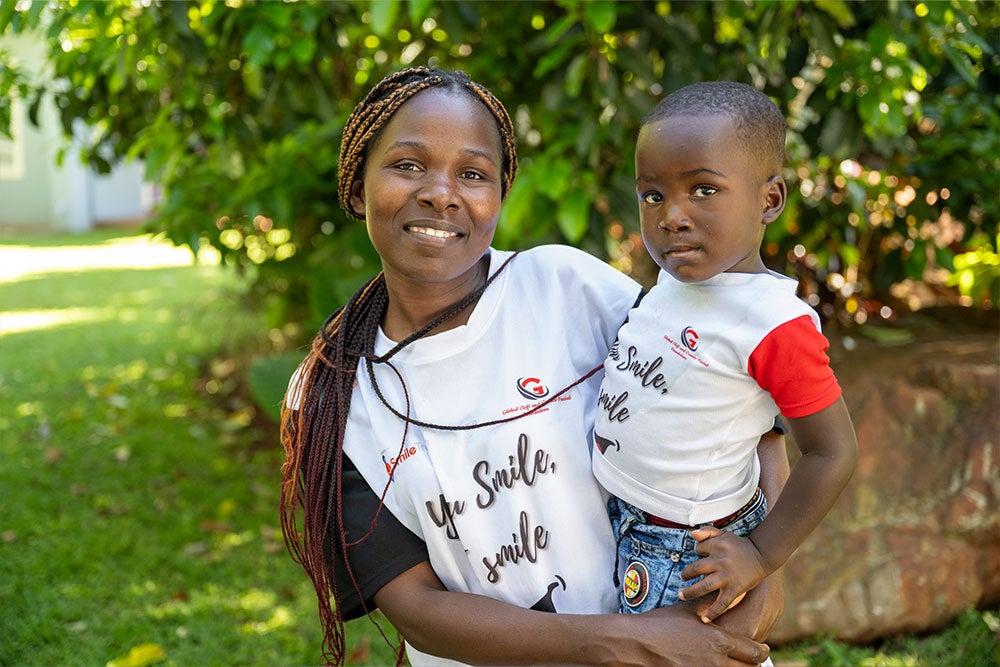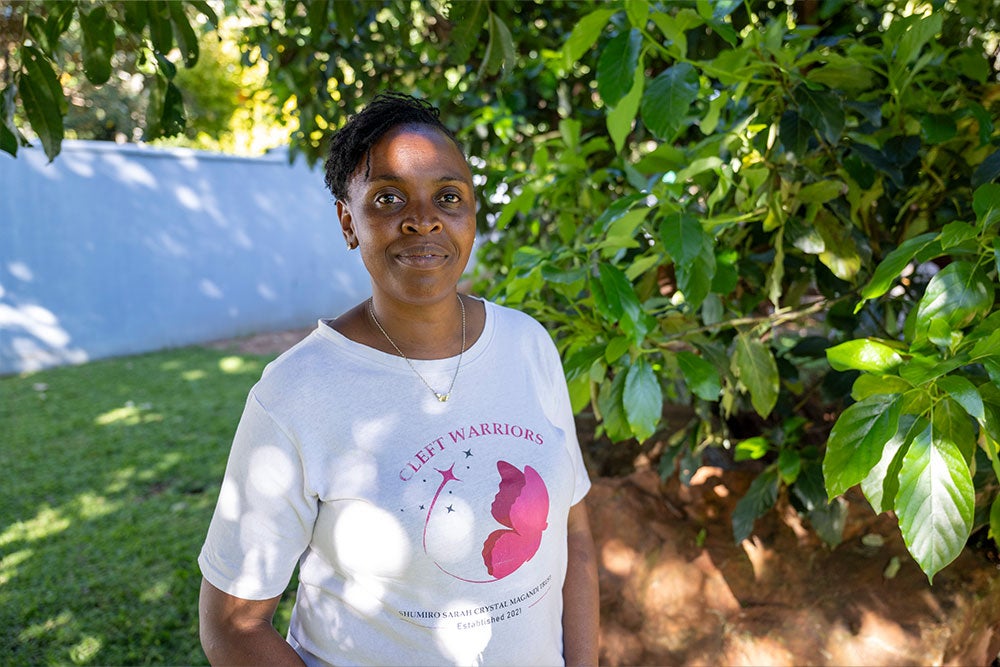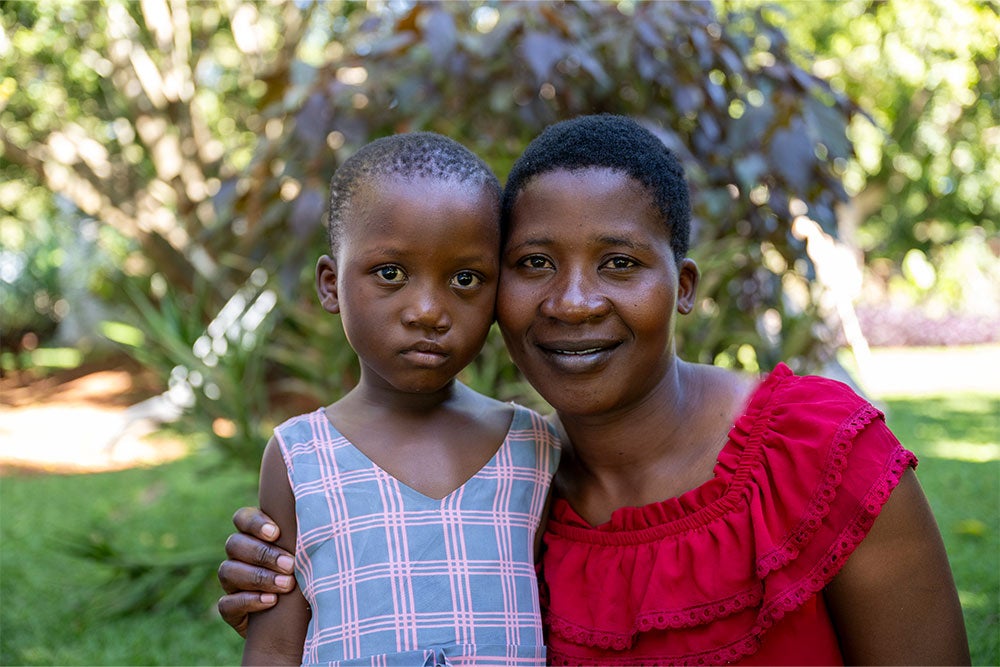Danai Magandi: Zimbabwe’s Cleft Warrior
She is healing from personal tragedy by giving hope to others

Danai Magandi lost her cleft-affected daughter, Shumiro, when she was just four months old. In the wake of that tragedy, Danai rose from unthinkable grief to start the Shumiro Sarah Crystal Magandi Trust, a local nonprofit (and Smile Train partner) whose goal is to provide emotional and logistical support to every cleft-affected family in Zimbabwe.
We recently caught up with this tenacious woman to learn her story. When we heard it, we just knew we had to share it with you, too.
I had no clue one of my babies would be born with a cleft. During my pregnancy, I had ultrasound scans and other checkups, but nothing suggested it. I was pregnant with twins, so perhaps they overlooked the cleft or weren't scanning well enough, but we could see both babies and everything seemed all right.
I had a c-section, and, at first, I thought that was why my babies weren’t in the room when I came back from recovery, as I expected. I kept asking about them, wanting someone to bring them to me. I got to a point where I was very frustrated. I was even asking, “Are the babies alive or not? Why are they not here?”
Finally, my husband and the doctor came through to explain that our son was fine, but our daughter had a cleft and a condition with her eye. When they brought Shumiro to me, it was more a relief than a shock. My baby was alive, and this was more important than what she looked like
Our cleft journey was hard. The doctors in the hospital didn't even know what was going to happen. They didn't know where the surgeries took place. They had no information, no support. Everything was vague. So, I did a lot of internet searching. I joined groups on Facebook for parents of children with clefts. I was discovering what a bilateral cleft was, what followed, and what the advice was. I did that all by myself. And so my journey was on me. It was me trying to hold on, to understand.
Sadly, with Shumi, we were in and out of hospitals for her entire life. It was a challenge every single time.
When Shumiro passed away in September 2019, at four months old, overcoming the grief was a journey of its own. And it still is a journey. Grief never ends, especially with a baby. I've come to understand that you grow with grief. It was and is all about dealing with my emotions and understanding.
I am very much a searcher of information. I want to understand what is happening. How am I feeling? Why? I understood the grief cycle, the whole denial, anger, bargaining, depression, all those emotions that you deal with. By that December, I got to a point when I said, "Okay, God, I want to understand why she came. I don't believe she came to me to be in pain. I think there's something more." At that point, I believe, came the acceptance.
In January 2020, just one month later, I got a call from a friend’s niece: “We've got a baby who looks exactly like Shumi, and we don't know what to do."
My struggle with Shumi opened my eyes. I started to see what was lacking and what people needed. I didn’t have someone to tell me, “Don’t worry. This is what happens. You're going to be okay. This is how you and your baby can get help.” I decided then that I should be that person.
Building a Trust
The pandemic delayed everything, but in 2021, I was able to enroll in a course to get a certificate in counselling. As a part of the programme, we discussed the prospects of starting a business. That’s when the light went on. I asked my teachers if I could suggest an idea for a nonprofit, and they asked me to present it in front of the class. I put my vision into a presentation about how passionate I am about helping the cleft community, how I understood their struggles, how I thought I could fit in helping mums along that journey.
I was already doing the work at this point. For example, I had already developed a WhatsApp group for cleft mums in Harare, but I now felt ready to go beyond that. Right after the class, I contacted my lawyer to register a nonprofit. I paid with my savings, selected some family members and two friends as trustees, and the Shumiro Sarah Crystal Magandi Trust was born.
That WhatsApp group is also how I came across Smile Train. Sibusisiwe Yona, Smile Train’s Program Manager for Southern Africa, messaged me one day asking for admin permission. I didn’t know her at the time, so I gave her a call. She explained what Smile Train does, and I shared my vision with her. It was clear at once that we were a good match.
Trust Building
The first thing our Trust did was host a joint lunch with Smile Train for parents and children at a hotel in Harare. We talked a lot, encouraging parents, giving them time to interact, socialise, and learn more about clefts. Most parents find the Trust through word of mouth. Whoever gets help always spreads the information, creating a chain of patients, friends, even strangers. If anyone meets someone with a cleft, they call me. I make sure to introduce myself to the mums in an early stage, before their baby’s pre-surgical health screening, if possible. Then I go to the screening with them. For two years now, every time there is a cleft surgery, I go to the screening. Sometimes, they call to say they didn’t make the screening, and we try to find a solution.

When I talk to someone for the first time, I also make sure to let them ask me questions. You can see the weight lifting off of parents’ shoulders when they realise they are not the reason their child has a cleft. In our WhatsApp group, too, I am trying to overcome the bias by exposing misleading articles. I wish I could go out there and speak more or distribute more flyers. I also do a lot of posting on social media. I’m trying to do whatever I can to normalise clefts and make people understand there is a solution.
Why We're Called Cleft Warriors

The most important thing for parents of a child with a cleft to know is simple: It is not your fault. It's a medical condition that has a surgical resolution. Cleft care is a journey, not a one-time job. I am here to walk the road with you. The one thing I know is that babies with clefts are the most resilient. They have such tenacity and strength. They are smart, good students. Keep on fighting until you manage. That's why we're called Cleft Warriors.
Ushering in a New Era for Zimbabwe’s Cleft Community
When I had Shumiro five years ago, there was a lack of information and understanding about clefts in Zimbabwe. People with clefts are much more visible now. People are seeing more pictures of children with clefts; they are more open to accepting it and more willing to understand what's happening.

In my opinion, in the next five years, the Shumiro Trust will be able to reach out to more people. My dream is to go to all the remote areas of the country and shed light on all the hidden babies. People are now realising that clefts are not something that we should hide from. We had a mum who had to run away from her husband to get treatment for her two children with clefts. She returned after she got surgery for one of the children and he became more open and agreed to the surgery for the second. You can tell from this story that information is crucial.
Smile Train will be a valuable partner in this work. In my view, they're trying to work with cleft patients a lot more than any other organisation. I thank Smile Train’s donors and want them to know we at the Shumiro Trust love you and appreciate all you do to help people with clefts. I especially appreciate how you also make sure our mums get good care, which, as I or any other cleft mum could tell you, is often the first step toward getting good care for her baby.
Shumi continues to be my inspiration every day. No blessing could ever compare to those precious moments I held her and cared for her, but to spend my days working alongside others to give Cleft Warriors and their families more health, more joy, more life in her honour… I know that she is looking down and smiling at how her memory is living on and making an impact that will last for generations.
Help Danai and heroes like her bring more health, more joy, and more life to families in need in 75+ countries.
